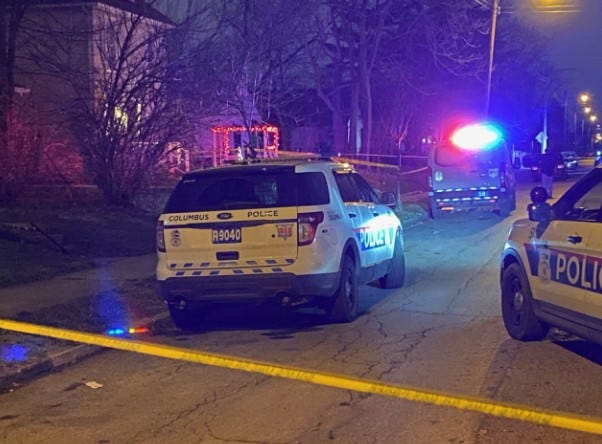By Theodore Decker, The Columbus Dispatch
We all know how to stop bleeding.
When our kid cuts a finger, we clean the wound and wrap it tightly with an adhesive bandage.
We apply pressure.
Violence prevention is no different. If an effort is measured and thoughtful and constant, research has shown that the violence may wane.
Let up on that pressure, and the blood flows again.
That has been a problem in Columbus for years.
There has been plenty of talk that the police can’t solve this alone, which is absolutely true. And there are plenty of grassroots groups laboring to reach at-risk youth, to chip away at longstanding economic and racial inequities, to curb violence. In one South Side neighborhood, residents have been at it for more than 11 years.
But when it comes to city government, that pressure has wavered. More attention has been paid of late, as skyrocketing homicide numbers in 2020 have persisted into 2021.
There are many good people in the city working to change this. We may not be familiar with all of them, but that might have less to do with their messaging than our willingness to hear it.
Last week I spoke to a few of them, members of the interfaith group BREAD — Building Responsibility, Equality and Dignity.
BREAD was instrumental in the city’s decision to hire noted criminologist David Kennedy and his team with the National Network for Safe Communities to assess the recent violence and what is driving it.
BREAD works on a host of social justice causes, from restorative justice to equitable housing. For several years now, the group has been pressing the city to pursue outside expertise and established violence-prevention strategies.
Knowing that I’ve written about the violence problem, group members wanted to share with me where they would like to see violence-prevention headed.
The city agreed to an $80,000 contract with Kennedy and the NNSC to conduct the current violence assessment. BREAD wants the city to continue the partnership with Kennedy for two more years. Otherwise, BREAD rightfully worries that Columbus might lose its momentum.
So how much are we talking about here? BREAD says the contract extension would cost $215,000.
I’m not one to propose the willy-nilly squandering of taxpayer money. But consider that the city just spent well more than twice that much to pay a law firm to investigate the actions of Columbus police during last year’s protests, only for Mayor Andrew J. Ginther and City Council President Shannon Hardin to announce they didn’t agree with the firm’s findings.
“We can’t put a price tag on the racial justice residents are seeking,” Hardin said in a written statement released by his office back then.
The same could be said about the violence, largely gun violence, that claimed 174 lives last year.
“This is an absolute public health emergency,” said Dr. Jon Groner, a pediatric trauma surgeon at Nationwide Children’s Hospital and member of BREAD.
In our discussion, BREAD members mentioned another funding option worth considering.
In a city that prides itself on public-private partnerships, why hasn’t a single captain of local industry stepped up to help pay for a cause like this? A well-established local insurance company, perhaps, or a health care services company now seeking a $420 million tax break?
Why that hasn’t happened is anyone’s guess. Maybe it is because homicides disproportionately affect parts of the city where the residents are the least empowered. Maybe associating your business with homicides, even if you are helping to reduce them, isn’t as profitable as tying your name to a professional sports team.
Columbus has proven that it has the drive and ability to accomplish all manner of feats when those feats are deemed vital to the city’s health. A few of those feats were accomplished after others had deemed them impossible.
If we can muster our resources to save a soccer team, surely we can do the same to save lives.
View the original story here.






